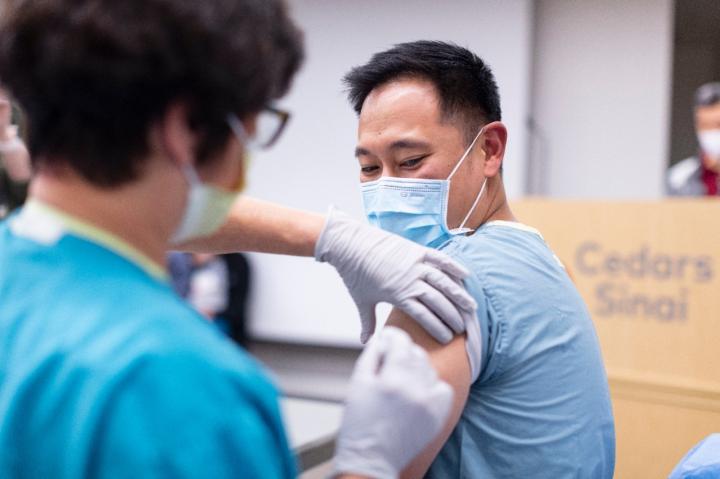Cedars-Sinai research involving more than 260 individuals supports earlier findings from small studies about efficacy of single vaccine dose for those with prior coronavirus infections; further study needed

Credit: Photo by Cedars-Sinai
LOS ANGELES (April 1, 2021) — A single dose of the Pfizer-BioNTech vaccine for individuals who previously had COVID-19 generates an immunologic response similar to that of individuals receiving the two-dose recommended sequence, according to a Cedars-Sinai study published today by the journal Nature Medicine.
“Our findings extend those from smaller studies reported elsewhere and support a potential strategy of providing a single dose of vaccine to persons with a confirmed prior history of coronavirus infection, along with two doses for people not previously infected,” said Susan Cheng, MD, MPH, MMSc, associate professor of Cardiology and director of Public Health Research at the Smidt Heart Institute at Cedars-Sinai. “This approach could maximize the reach of a limited vaccine supply, allowing potentially millions more people to be vaccinated in the U.S. alone.”
The vaccine that was studied, produced by Pfizer Inc. and BioNTech SE, normally is administered in two doses, 21 days apart, to provide nearly full protection against the novel coronavirus, known as SARS-CoV-2.
The Cedars-Sinai research strongly suggests the second dose may not be needed for individuals who have successfully recovered from a prior coronavirus infection.
“Overall, individuals who had recovered from COVID-19 developed an antibody response after a single vaccine dose that was comparable to that seen after a two-dose vaccination course administered to individuals without prior infections,” said Kimia Sobhani, PhD, medical director of the clinical core laboratories and associate professor of Pathology and Laboratory Medicine at Cedars-Sinai. “It appears that a single booster dose given to previously infected individuals offers the same benefit as two doses given to people without prior infection.” Sobhani and Cheng, along with Jonathan Braun, MD, PhD, professor of Medicine at the F. Widjaja Foundation Inflammatory Bowel and Immunobiology Research Institute at Cedars-Sinai, co-senior-authored this study.
For their research, the investigators administered surveys to 1,090 healthcare workers in the Cedars-Sinai Health System who had received the Pfizer-BioNTech vaccine. The surveys asked the workers about prior coronavirus infections and any symptoms they might have experienced after being vaccinated.
The healthcare workers also took antibody tests to gauge the response of their immune systems to the vaccinations. Antibody levels were measured at three points in time: before or up to three days after the first dose, within seven to 21 days after the first dose, and within seven to 21 days after the second dose.
Based on the surveys, the research team identified 35 individuals with prior coronavirus infections who had received a single vaccine dose and 228 individuals without prior infection who had received both vaccine doses. Based on the antibody tests, the team found that levels and responses of coronavirus-specific antibodies were similar in both of these groups.
Post-vaccine symptoms were more prominent for those with prior infection after the first dose, but symptomatology was similar between the two groups after the second dose.
The investigators said their study had limitations and that more research will be needed to confidently guide vaccine policy.
They noted that they measured antibody levels only up to 21 days following each vaccine dose and that longer-term follow-up likely would provide additionally informative data, especially regarding the duration of the immunity acquired from receiving a single versus double dose of the vaccine.
They also noted that even larger cohort samples will be needed to examine differences across demographic and clinical subgroups that are known to exhibit variation in antibody response following vaccination. More studies also are needed to determine if the results seen after a single dose of the Pfizer-BioNTech vaccine might also apply to other SARS-CoV-2 vaccines, they added.
###
The vaccine study and related research are part of the Coronavirus Risk Associations and Longitudinal Evaluation (CORALE) study conducted by a network of clinicians and scientists from multiple institutions, primarily in Southern California. The network receives support from the National Cancer Institute of the National Institutes of Health as part of the National Serological Sciences Network, an initiative to advance knowledge of immunology and COVID-19 in the U.S. Cedars-Sinai is one of eight institutions that have been awarded NCI grants to conduct multiple research projects for the initiative.
Funding: Research reported in this publication was supported in part by Cedars-Sinai, the Erika J. Glazer Family Foundation, the F. Widjaja Family Foundation, the Helmsley Charitable Trust, the National Institutes of Health under grant number K23-HL1538 and the National Cancer Institute of the National Institutes of Health under grant number U54-CA260591-01.
Competing interests: John C. Prosko, Edwin C. Frias and James L. Stewart work for Abbott Diagnostics, a company that performed the serological assays on the biospecimens that were collected for this study. The remaining authors have no competing financial interests.
Read more on the Cedars-Sinai Blog: mRNA Vaccines: An Explanation
Media Contact
Jane Engle
[email protected]
Original Source
https:/
Related Journal Article
http://dx.




